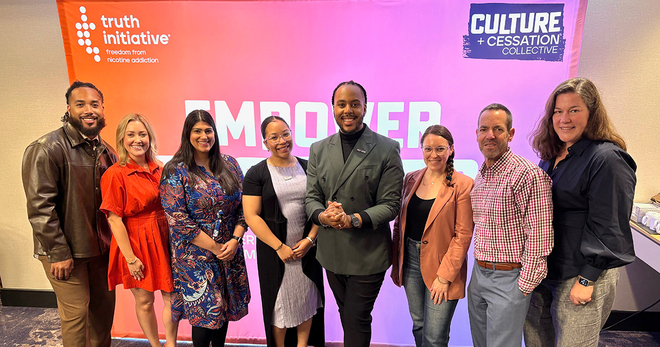Q&A: Helping college campuses go tobacco-free
The number of colleges and universities with comprehensive smoke- or tobacco-free policies more than tripled from 446 campuses in 2010 to more than 1,700 campuses in 2016. Much of that progress, however, occurred at traditional four-year universities.
That’s why Truth Initiative is helping Historically Black Colleges and Universities (HBCUs) and community colleges advocate for, adopt and implement 100 percent smoke- or tobacco-free policies. Since 2015, Truth Initiative has provided grants and expert assistance to more than 80 community colleges and almost 50 HBCUs in 35 states, Washington D.C. and the U.S. Virgin Islands. These efforts will protect more than 1 million students.
We spoke with Denise Smith, HBCU manager of Truth Initiative’s Community and Youth Engagement program, to find out more about the work behind making HBCUs tobacco-free.
Q: Why is it important to work on these campuses?
A: It’s important to work with college campuses because tobacco-free policies are proven to prevent young adults from starting tobacco use and to help tobacco smokers quit. And, these policies reduce everyone’s exposure to secondhand smoke.
Remember, almost all smokers—99 percent—start smoking before turning 27 years old. The academic institutions we’re supporting tend to serve first-generation college students, students of color and students from low socioeconomic communities. These are young people who may live in neighborhoods where tobacco product marketing is pervasive, and tobacco products, like menthol and little cigars, are readily available.
Q: What do you hope to accomplish by partnering with these schools?
A: Our goal is to make campus environments healthier places to live, work and learn. Of the 105 HBCU campuses, only 36 have comprehensive tobacco- or smoke-free campus policies today. We are working to double the number of HBCUs that have adopted smoke- or tobacco-free policies by December 2017.
This effort is especially relevant on HBCU campuses because the African-American community has been the target of tobacco industry marketing for decades. By partnering with HBCUs, we have the chance to protect the next generation of leaders from smoking-related illnesses, the number one preventable cause of death in the African-American community.
Q: What is Truth Initiative’s role in the initiative?
A: We build relationships with campus leaders at the schools we support. We conduct face-to-face meetings to train our project leads and student representatives. This includes guidance in developing a strategy to advocate for, adopt and implement a tobacco-free campus policy. Then, we support their organized activities and events to make it happen.
Q: So, how does the initiative get started?
A: Campus leaders–students, staff and administrators–form a task force and develop a step-by-step plan for achieving a campus policy. The plan includes reaching out to campus groups (such as the health and wellness program), creating a coalition or sub-committee to assist with tasks (such as drafting a policy recommendation like the model policy provided by Americans for Non-Smokers’ Rights Foundation) and identifying culturally appropriate tobacco cessation resources.
Q: How does the campus community learn about the effort?
A: Events and activities are planned in order to raise awareness and educate members of the campus community.
Activities might include tabling to encourage students to sign a smoke-free pledge, smoke-free poetry readings or tobacco-free themed sports tournaments. It’s also a good idea for the task force to host town hall meetings where members of the community can learn about the benefits of a tobacco-free campus.
Shorter College’s campus-wide education campaign “Our Healthy HBCU”, for example, involved monthly “Shorter Talks” to discuss the issue of tobacco on its campus. They also planned an event in conjunction with the American Cancer Society’s annual Great American Smokeout.
Q: What advice do you have for creating a successful tobacco-free campus campaign?
A: At the beginning of the effort, it is critical to gather data to assess the campus community. That helps you to understand the campus community’s views about tobacco use and what their opposition to going tobacco-free might be. The most common mistake I’ve seen made is assumptions about the campus culture without good evidence.
There will be those who don’t believe that tobacco use is an issue on their campus. The assessment results will give you valuable insights–and often show that a majority of people support a policy change. The assessment findings will help you educate the community by revealing facts, such as which tobacco products are most commonly used on campus.
Q: How should students be included in the process?
A: You have to give the student body a chance to voice their opinions about the impact of a tobacco-free campus. Students will want to know how the policy will be communicated and enforced. Host forums where they can learn about the change and create fun events that allow them to ask questions and share their thoughts.
Social media is also a great way to give students a voice. I’ve seen students take to social media with the hashtag #TobaccoFreeHBCU to promote their campus going smoke-free.
Q: Besides colleges and universities, are other organizations part of this initiative?
A: We’ve partnered with the American Heart Association on health-related activities to encourage preventive measures to decrease the incidence of tobacco-related cardiovascular disease and stroke. Together we’ve hosted workshops to educate students on social justice, tobacco and the power of student activism to change policies on campuses throughout the south and southeast. We are also working with the National Pan-Hellenic Council’s “Divine Nine”, a collaborative organization of nine international and historically black Greek letter sororities and fraternities. They, with our help, have pledged to tap into the power of student activism and social media to mobilize their brothers and sisters around tobacco prevention.
Q: Any last thoughts?
A: The work is hard. But it’s rewarding to know that what we do will help make campus environments healthier and create a generation that will end tobacco use.
More in tobacco prevention efforts
Want support quitting? Join EX Program
By clicking JOIN, you agree to the Terms, Text Message Terms and Privacy Policy.
Msg&Data rates may apply; msgs are automated.


